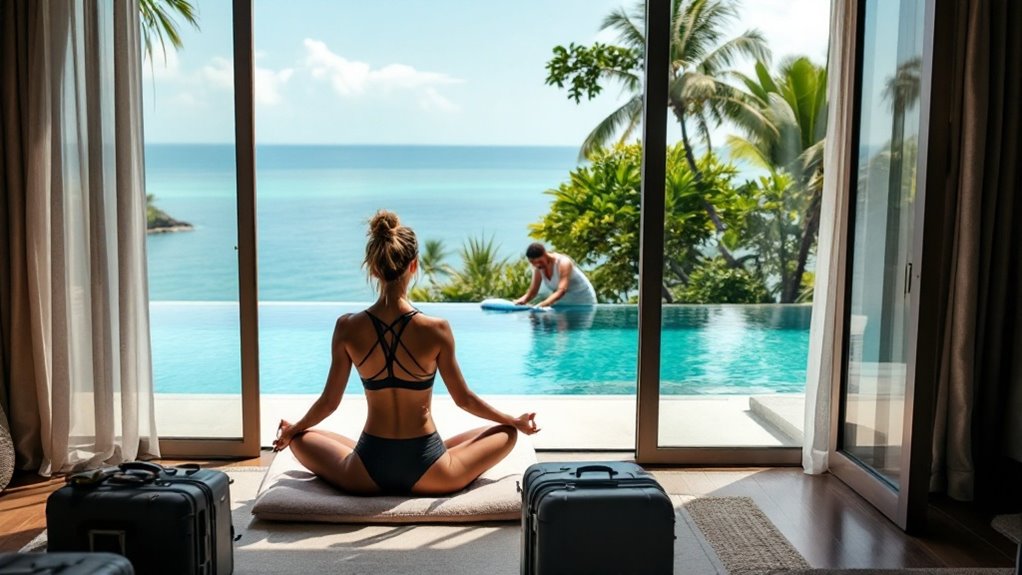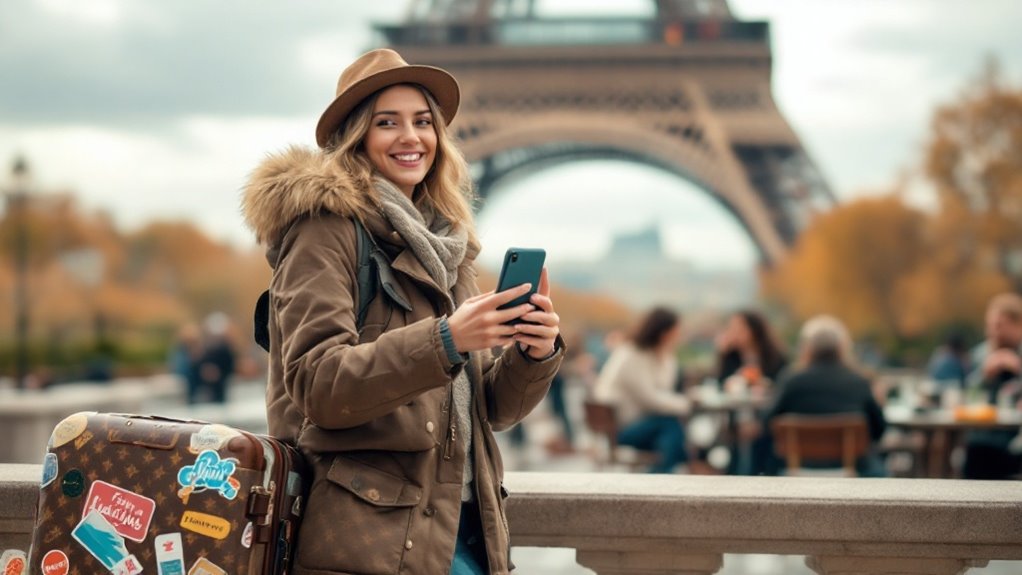Physical Address
304 North Cardinal St.
Dorchester Center, MA 02124
Physical Address
304 North Cardinal St.
Dorchester Center, MA 02124

Physical movement through space doesn’t automatically lead to personal growth. While travel can broaden your horizons, simply collecting passport stamps or Instagram photos won’t make you more enlightened or culturally aware. True transformation requires intentional engagement with local communities, genuine cultural exchange, and honest reflection on your own privileges and biases. Breaking free from superficial tourism and embracing authentic experiences will reveal travel’s deeper potential for meaningful change.

While travel can expand our horizons and enrich our lives, it’s important to understand the hidden costs it can have on our health and wellbeing.
You’ll face increased healthcare expenses when seeking medical care away from home, with studies showing Medicare spending jumps 14% for patients traveling over an hour for treatment. Your mental health might also take a hit – from stress spikes during travel disruptions to anxiety about maneuvering foreign healthcare systems.
Regular travel can disrupt your body’s natural rhythms and lead to elevated cortisol levels, making stress management more challenging.
Physical health risks escalate too, especially if you have chronic conditions requiring consistent care.
You’re more likely to need emergency services when far from your regular providers, and international medical evacuations can cost up to $250,000 without proper insurance.
Even routine healthcare becomes complex when you’re constantly moving, as appointment adherence drops considerably with longer commute times.
Behind every perfect Instagram travel photo lies a carefully constructed fantasy that shapes how we view destinations worldwide. You’ll rarely see the hours spent editing photos, removing crowds, or staging “authentic” moments. What appears as effortless wanderlust often masks financial struggles, burnout, and intense pressure to maintain an idealized lifestyle. Travel content creators spend countless hours achieving their signature maximalist aesthetic through careful curation.
Understanding these realities doesn’t diminish travel’s value – it allows you to embrace authentic experiences without the burden of unrealistic expectations.
You’re free to discover destinations on your own terms, beyond the filters and presets.

The true cost of travel extends far beyond our filtered photos and curated social media moments.
Beyond the perfect Instagram shots lies a deeper reality of travel’s hidden environmental and cultural footprint.
While you’re capturing that perfect sunset at a beachfront resort, coastal mangroves – nature’s carbon-storing champions – might’ve been cleared to build your temporary paradise. Your business class seat to that dream destination generates four times the emissions of economy, contributing to tourism’s massive 8% share of global greenhouse gases.
You won’t see the environmental impact in your Instagram stories: the fragmented wildlife habitats from resort construction, the coral reefs dying from mass tourism, or the fossil fuels powering your hotel. Despite recent improvements, the tourism industry still relies on fossil fuels 88.2% for its energy needs.
Even as the industry makes modest gains in sustainability, your wanderlust still carries a hefty ecological price tag that no filter can disguise.
While your adventures abroad create incredible memories, you’ll inevitably miss milestone moments back home – from your best friend’s wedding to your niece’s first steps.
Long-distance relationships require extra effort as physical separation can amplify communication challenges and emotional strain, especially when time zones complicate your connection.
You’ll need to develop creative ways to maintain intimacy with loved ones, whether through scheduled video calls, shared online activities, or writing thoughtful messages that bridge the physical gap. While research shows that shared new experiences strengthen relationships, extended time apart can test even the strongest bonds.
Choosing to pursue extensive travel often means wrestling with one of life’s toughest trade-offs: missing pivotal moments with loved ones. The statistics paint a sobering picture of what you might sacrifice: over a third of frequent travelers miss key celebrations like birthdays and anniversaries, while participation in daily family life drops by 41%. Research shows that couples who don’t travel together have 73% lower satisfaction in their relationships.
While technology helps bridge some gaps, these missed moments can create lasting ripples in your relationships. Understanding these potential costs helps you make more intentional choices about when to travel and when to prioritize being present.
Although modern technology helps us stay connected across continents, maintaining long-distance relationships during extended travel creates unique emotional challenges that can test even the strongest bonds.
When you’re exploring new horizons, time zones complicate daily communication, while digital interactions can’t fully replace the warmth of physical presence. The lack of intimacy often causes relationships to become more casual and disconnected over time. You’ll find that scheduled video calls often feel more formal than spontaneous conversations, and the financial strain of visiting each other can limit meaningful reunions.
The emotional toll becomes particularly evident as you miss sharing life’s small moments, and chronic loneliness can creep in despite regular online contact.
While social media keeps you updated on your partner’s life, it may also fuel insecurities and trust issues. Understanding these challenges helps you make informed decisions about balancing your travel aspirations with relationship needs.

Despite the common perception of travel as universally accessible, modern international tourism remains deeply intertwined with systems of privilege and inequality. Your passport’s power, economic status, and identity greatly shape your travel experiences and opportunities.
While travel can broaden perspectives, it’s vital to acknowledge these disparities. Understanding your privileges as a traveler helps foster more responsible tourism and supports efforts to make travel more equitable and accessible for everyone. Native English speakers especially benefit from language privilege abroad, with most tourist destinations providing English translations and services.
When travelers move beyond superficial tourist experiences, they unfasten transformative opportunities for genuine cultural exchange.
Rather than rushing through scripted photo ops and performative displays, you’ll discover deeper connections by slowing down and engaging meaningfully with local communities.
Authentic cultural experiences emerge when we pause, listen and genuinely connect with the places and people we encounter.
You’ll find that authentic culture requires moving past transactional relationships. These genuine interactions foster cross-cultural empathy that naturally challenges preconceptions and stereotypes.
Instead of viewing traditions as consumable products, participate in community-led programs that preserve cultural integrity. Learn the local language, share meals with families, and contribute to collaborative projects that benefit the community directly.
This mindful approach helps you develop nuanced cultural understanding while ensuring tourism revenue reaches local businesses and artisans.
You’re not just passing through – you’re participating in an equitable exchange that fosters genuine human connection and sustainable practices.

Simply being physically present in a new location won’t automatically spark personal growth during your travels. Without intentional engagement and reflection, you might miss valuable opportunities for transformation. Your physical journey needs to align with a mindset ready to embrace new experiences and challenges.
Cultural immersion enhances empathy and understanding of diverse perspectives in ways surface-level tourism cannot achieve.
To truly grow through travel, you’ll need to actively participate in cultural exchanges, step beyond your comfort zone, and thoughtfully process your experiences.
Growth happens when you’re willing to embrace the unfamiliar and learn from each interaction.
Just like a compass needle doesn’t always point true north, your travels won’t automatically transform you into a better person. What matters is how you approach each journey, process your experiences, and integrate them into your daily life. You’ll find that meaningful personal growth can happen anywhere – whether you’re crossing continents or crossing your own neighborhood. It’s about intention, not just location.